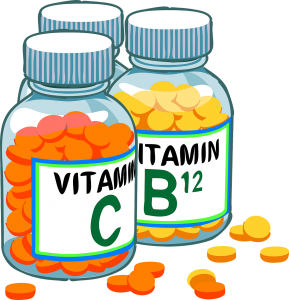
Protein powders, multi-vitamins, fat-burners, creatine, nitric oxide boosters… the good, the bad and the ugly.
If you’ve been in the fitness game for some time, chances are, you’ve tried products geared towards making you a better athlete. Walk into any gym and the first thing you’ll see (apart from out-of-shape receptionists) is a wide selection of powders, pills and neon-colored liquids. All sitting there in shiny bottles waiting for you.
Back when I worked for a leading supplement distributor, I’d frequently see people shopping for supplements before they ever set foot inside a gym. These guys were certain they’d have to load up on supplements before curling their first dumbbell. Even back then, I was shocked to see how successfully these poor bastards had been brainwashed.
The industry’s marketing machine conditioned us to believe that training without the use of special supplements is futile.
But the truth is, you don’t need any pill, powder or potion to get results.
I’ve had a deep fascination for these “magic” products and studied them extensively for over a decade. Researching the literature, listening to user feedback and trying my fair share of supplements. My verdict after all these years?
Supplements are largely dispensable.
Take protein powders for instance. They’re being hailed as one of the greatest inventions of mankind, but there’s nothing these powders have over real food. Granted, protein supplements represent a decent source of dietary protein. But why not have a whole food protein-rich meal instead?
Real food will always be superior to the stuff sold in bottles.
Steak, a cheese omelet or a protein shake? What do you think will keep you fuller for longer? What do you think supplies more essential nutrients?
The only reason to opt for powdered protein is convenience. If you need a quick, high-protein “meal” then yes, a shake is a valid option. Whenever I have some protein lying around, I use it to make tasty desserts, like protein pudding or pancakes. It’s a decent way of curbing a sweet tooth and bumping up your dietary protein. Apart from that, there’s absolutely no need to supplement with extra protein, if you eat properly. (read this)
Fat burners, pre-workout boosters, muscle-gaining supplements and other magic pills are a waste of your hard-earned money (and that is putting it mildly).
If you’re looking for an edge to boost your metabolism or get you in the zone before your workouts, save your money and use black coffee (you’re welcome). If your weight-loss is stalling, don’t go looking for short-cuts. Ditch the magic pills and modify your diet and training. Simple as that.
If you do decide to use a supplement, or you have a product you like, find the minimum effective dose. You’ll frequently see people recommend crazy amounts of various substances. I advise you to tread carefully, though.
Find the smallest dose that delivers results and stop there.
“What do you take, Victor?”
Personally, I don’t use supplements. Actually, I do like and use magnesium supplements and find myself popping a few zinc pills every once in a while, but that’s it. I’ve gotten in the best shape of my life without using any protein powders, vitamins, fat burners, boosters or any of that stuff. There are, however, a few products I generally recommend.
A few years back when I used to frequent my local gym (I train at home or outdoors most of time now), I would always get asked what I was “on”. My answer would leave people puzzled – Nothing? – Why wouldn’t I take the stuff if it were available to me?
Simply put, supplements didn’t give me anything serious training and good eating couldn’t provide.
I’ve tried a ton of products and didn’t see any real benefit. Like I said though, there are a select few products I recommend. They’re by no means mandatory, but they can provide an edge, given the right scenario.
Most people today are deficient in key vitamins and minerals like zinc, magnesium, vitamin D and choline (Wallace et al, 2014). How do you make sure you’re not among those people? Pop a few pills? It’s not that simple. It’s never that simple. Eat better, get more sun exposure (vitamin D, anyone?), and in case of a deficiency, incorporate a few key vitamins and minerals into your regimen.
Lean and Mean Supplement Stack:
- Magnesium
- Zinc
- Vitamin D3 (if you can’t get any sun)
Magnesium is a dietary mineral and the second most abundant electrolyte in the human body. It regulates over 300 chemical reactions and is essential for proper ATP (= energy) synthesis.
Magnesium and vitamin D deficiencies are the most common in developed countries. If you’re very active, living in a high stress environemnt or eating a substandard diet, you should definitely look into magnesium supplementation. This is one of the very few supplements I enjoy using and I can feel working right away (this is what I use).
The best (most bio-available) forms to take are magnesium glycinate, citrate and malate. I also use and recommend a topical magnesium oil that absorbs through the skin (real good stuff). I won’t give any specific dosing instructions because, depending on your vital stats, lifestyle and other factors, your individual sweet spot will vary. Find the minimum effective dose.
Zinc is an essential mineral (trace element) with multiple health benefits (read, read). Despite being a very popular practice in bodybuilding circles, I wouldn’t recommend mega-dosing zinc. 15-30mg/day will be plenty for most. If you’re going to add zinc to your arsenal, opt for zinc citrate, glycinate, picolinate or monomethionine due to their superior bio-availability (I use this one). As with all supplements, find the minimum effective dose.
If you can’t get out into the sun regularly, supplementing with vitamin D3 is something you should consider. This is especially true for people suffering from the winter blues, depression and/ or anxiety. Low levels of vitamin D3 are also correlated with low testosterone. The vitamin D produced by your skin when exposed to direct sunlight is prefered to the stuff sold in bottles, nevertheless, if you don’t have any other options consider giving it a shot.
Honorable mention: Creatine is probably the most well researched muscle-building supplement around. It has been proven (numerous times, actually) to improve strength and performance in athletes (read, read). Interestingly, creatine may provide additional health benefits due to its immune boosting and neuroprotective properties (read). According to the research, there’s also no need to worry about side-effects, if dosed properly (up to 5 grams/day). If you’re considering a performance enhancing supplement, creatine is definitely one of the better options.
“Whaaat?? No fish oil?”
That’s right. Eat a balanced diet and forget about those nasty smelling fish pills. Get your omegas from wild caught fish, walnuts and other whole food sources. Again, whole foods are always preferred to pills and powders.
Get Checked!
Before you start popping pills and snorting powders (I’m kidding, relax) go to your doctor and get a full blood panel done. Get your vitamin and mineral levels as well as your hormone levels checked. It’s absolutely worth the small investment. Then and only then are you in a position to selectively introduce certain vitamins, minerals and other products to fill in the gaps.
Don’t blindly swallow random pills because “might as well”. This shotgun approach to health care is bound to leave you with more side effects down the road. If you’re intrigued and want to know more about supplements head over to examine.com. This is the ultimate science-backed supplement resource.
Alright my friends, this concludes our lesson for today.
Thank you for reading
Victor
Resources:
Bitanihirwe, B.K./ Cunningham, M.G. (2009). Zinc: the brain’s dark horse. Synapse 63(11): 1029-49
De Meo et al (2015). Does the use of dietary supplements enahce athletes’ sports performances? A systemic review and a meta-analysis. ebph 12(4)
Maret, W./ Sandstead, H.H. (2006). Zinc requirements and the risks and benefits of zinc supplementation. J Trace Elem Med Biol. 20(1):3-18.
Riesberg et al (2016). Beyond muscles: The untapped potential of creatine. Int Immunopharmacol. S1567-5769(15)30239-3
Wallace, T.C./ McBurney, M., Fulgoni III, V.L. “Multivitamin/Mineral Supplement Contribution to Micronutrient Intakes in the United States, 2007–2010.” Journal of the American College of Nutrition 33.2 (2014): 94-102.
[…] was a sucker for shitty diets, worthless supplements and unreasonable fitness protocols for the first 5 years of training (I’m a slow learner). I […]